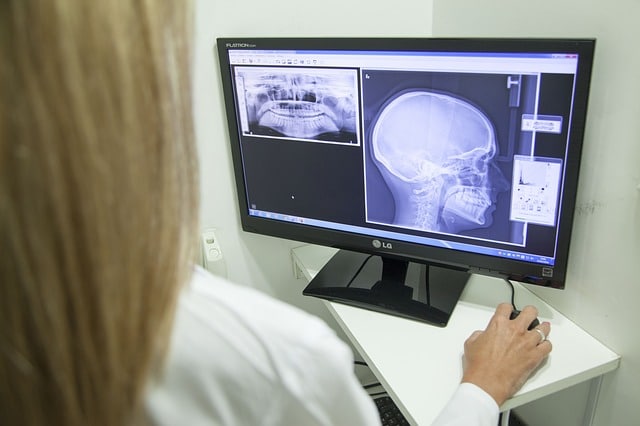If you find yourself experiencing prolonged pain of the jaw right below the cheekbone, you might have a temporomandibular joint disorder.
The temporomandibular joint (TMJ) is what connects your jaw to the rest of your skull, located right under the cheekbone. Whether the cartilage has worn away, or is inflamed from prolonged pressure, this can be at times an extremely painful disorder.
The causes of temporomandibular joint disorder are often hard to determine. In the case of arthritis, wearing away of the cartilage causes the actual bone tissue from the cheekbone and jawbone at the joint to rub onto each other. For people who habitually grind their teeth, the tissue in between the joints can become inflamed, causing pain.
Symptoms of TMJ Disorder
Living with a TMJ disorder is uncomfortable at best and at its worst a painful and debilitating condition.
For extreme cases of TMJ Disorder, the jaw can actually lock open or shut. In this case, forcing the mouth open or closed can lead to more permanent damage—for these cases, consult an oral surgeon immediately.
Otherwise, symptoms can include a pervasive and lasting aching of the face, pain while chewing, tenderness of the jaw, or an aching around the ear. Oftentimes, multiple symptoms are experienced at once.
Getting Rid of TMJ Disorder
In most cases, getting rid of TMJ Disorder is simply a matter of changing behaviors. After a consultation with an oral surgeon, he or she can determine whether you are able to undertake self-correcting behaviors to treat your TMJ Disorder.
Some non-surgical, self-corrective procedures can be done in the home. Placing a heat pack or a container of warm water at the site of the pain will reduce tension and stress on the jaw muscles.
You can also switch to a soft-food diet. When chewing on harder foods, the muscles in the jaw have to work harder to break things down, which means the pain from a TMJ Disorder will persist because the jaw does not have an opportunity to rest.
Sometimes, self-corrective measures can be as simple as not chewing gum or cradling a phone between your shoulder and head. Also, uncomfortable sleep positions may be the cause of your TMJ Disorder, so changing to a position that supports your head and neck properly could mean wonders for your jaw pain.
In more extreme cases—such as when the jaw locks—the work of an oral surgeon or dentist is almost always preferred. Though considered a last resort, your oral surgeon will be able to determine if a surgical approach to curing TMJ Disorder is the right course of action.
There are a few surgical procedures for curing TMJ Disorder, which differ in extent and healing time:
Arthrocentesis TMJ Surgery: Using a local anesthetic, an oral surgeon will insert a needle into the infected TMJ and “irrigating” the area with a sterile solution. This flushes out excess scar tissue and inflammatory liquids. Typically the healing process takes two days or less.
Arthroscopic TMJ Surgery: A more extensive procedure, arthroscopic surgery—or arthroscopy— is when the surgeon makes an incision near the ear and inserts a wire with a small camera. Then, after the infected area is found, the surgeon will use a tool to remove excess tissue and liquids.
Arthroplasty TMJ Surgery: The most extensive of procedures used to cure TMJ Disorder, this procedure is performed under general anesthesia at a hospital, as opposed to the arthrocentesis or arthroscopy, which are performed in a surgeon’s office.
A larger incision is made along the jaw to completely expose the temporomandibular joint. Then, the surgeon will remove larger sections of scar tissue, bone spurs, and other major causes of the pain. Healing from arthroplasty can take weeks or months, and typically is accompanied by a rigorous healing regimen.
Experiencing prolonged jaw pain is something no one should deal with. It’s not only painful—it can impede some of the finer pleasures of life. If you’re experiencing prolonged jaw pain, you might have a TMJ Disorder. Whether there’s a need for surgery or self-corrective behaviors, contact us today for a consultation at 02 6362 1987 so we can get you on the path to recovery.

